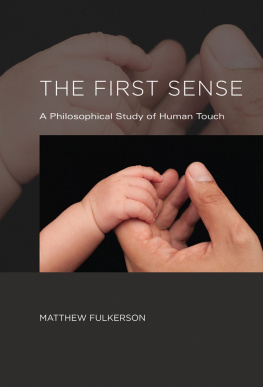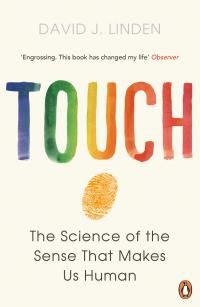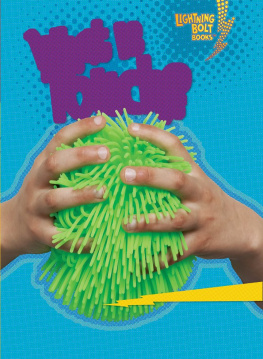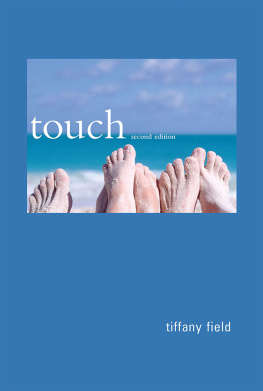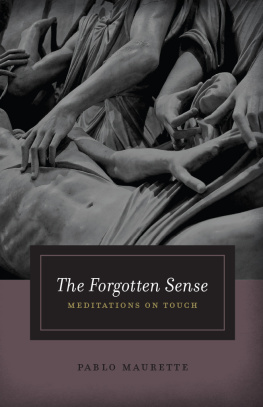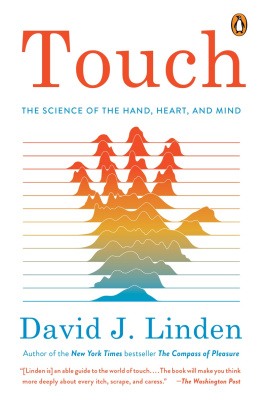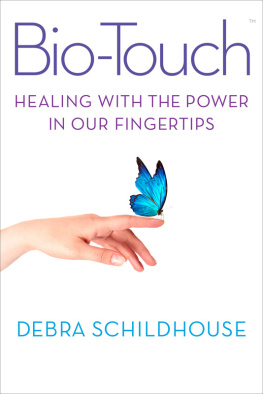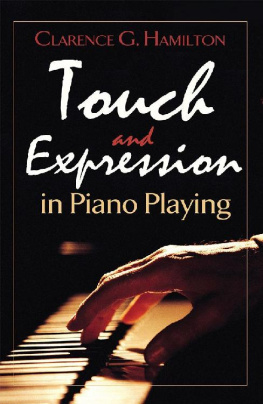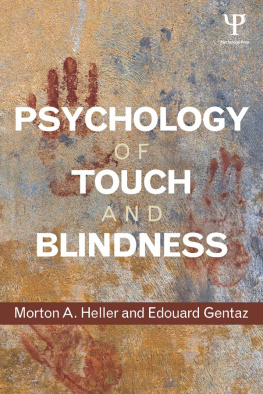Preface
Human touch is a highly complex sensory modality, involving numerous interacting systems and exploratory capacities. Through touch we are able to interact directly with the world around us, feeling a wide variety of distinct properties, including warmth, solidity, roughness, and elasticity. We often incorporate tools to expand our reach and abilities. We use touch to comfort and console one another, and touch is also one of our primary conduits of pleasure and pain. Given these many qualities, and its foundational role in human experience, the sense of touch offers rich, fertile ground for philosophical investigation.
In this book I offer an empirically sensitive philosophical account of the sense of touch. I defend the view that touch, despite its functional diversity, is a single, unified sensory modality. To defend this unity, I describe and argue for a novel, unifying role for exploratory action in touch. The involvement of exploratory action described here differs importantly from the role of action in other sensory modalities. Later chapters fill in the details of this unified, exploratory form of perception, providing philosophical accounts of tool use and distal touch, the structure of tangible properties, the spatial content of touch, and the role of pleasure in tactual experience.
As should be clear from this brief introduction, this is not a work primarily on the science of touch, nor does it concern the development, history, or social meaning of touch. It is a work of contemporary philosophy, representing the interests, methods, and approach that define the discipline. The questions it addresses are thus essentially philosophical, concerning sensory content, representation, and reference; dependency relations (of various sorts) between perception, bodily awareness, and exploratory action; and the phenomenal and epistemic nature of tactual experience. This does not mean that it is mere armchair theorizing. I am deeply committed to the model of cognitive science as an interdisciplinary enterprise, one in which philosophy has an important role to play. While concerning itself throughout with issues of general philosophical concern, the book strives at every point to take seriously the insights and constraints of empirical work on touch. Human touch, like many aspects of our conscious lives, is a messy, complicated, and multidimensional object of investigation. It is my firm belief that advances in our understanding of human touch will be best accomplished by careful, measured progress in many fields, using a variety of methods and approaches.
So if this is not a work in the development of human touch, you may be wondering why I decided to call it The First Sense. Well, touch is the first sense to develop in the womb, and the basic receptor types involved in touch are probably among the earliest in the evolutionary record. However, this is not why I decided to use this title. Humans are sometimes described as a visual species. Like many generalizations, this claim has much to support it. A substantial portion of the human brain is devoted to visual processing, and visionwith its vivid colors, textures, shapes, and vistasplays a central role in our experience of the world. Yet it is another, often neglected sense, that may be our most immediate and powerful sense. The humble sense of touch lacks the fireworks of vision, but what it lacks in thrills it more than makes up in importance and priority. Brian OShaughnessy once started a paper on touch by asking Which of the senses is No. 1? He concluded that touch must be No. 1, because it was essential to the animal condition as such and that it overlapped with the sheer capacity for physical action on the part of its owner (OShaughnessy 1989, p. 37). OShaughnessy was on to something here.
To see the hidden importance of touch in our daily lives, consider that while many humans live comfortable, fulfilled lives without vision or audition or smell or taste (or even without several of these), total loss of touch is both exceedingly rare and devastating for normal human existence. The sense of touch may seem relatively basic, yet in humans it finds a level of sophistication that is striking in its complexity and usefulness. As Ive noted, touch involves our entire body and offers awareness of a range of distinct and important features of the world. Through touch we are able to manipulate and interact with both small and complex objects, comfort and console one another, and use tools to expand our reach and abilities. Touch is also one of our primary conduits of pleasure and pain. Given these many roles, and its fundamental necessity for life, I thought it only fitting that a book on this remarkable sense honor this importance in some fashion. Hence The First Sense.
I had two goals in writing this book:
1. To provide a philosophically robust account of the nature, structure, and content of perception through touch.
2. To show that work in touch has deeper implications for our general understanding of perception and perceptual experience.
The first goal of this book is to provide for touch the kind of systematic, comprehensive treatment that is common in philosophical discussions of the other sense modalities (especially vision) and other central aspects of cognition (like attention and reasoning). Achieving this goal involves working through key fundamental issues in the philosophy of perception and cognitive science to arrive at a better understanding of touch. For instance, clarifying the distinction between unisensory and multisensory experience is essential for showing that touch is a unified sensory modality.
The second goal involves showing that an account of touch has deep implications for recent debates in the philosophy of perception. The unique role played by exploratory action in touch, for instance, undermines the received view that action plays the same role in all of the sensory modalities. This is a radical departure from traditional philosophical approaches to perception that have focused almost exclusively on vision and visual experience, assuming that whatever theory best accounts for visual experience will apply equally to all of the other sensory modalities. To avoid these sorts of assumptions, I wrote this book while remaining as neutral as possible on many central choice points in the philosophy of perception. In this way, I was able to focus on the unique issues and concerns that arise in our understanding of touch and see what broader implications they may have for our understanding of perception generally.
Acknowledgments
Many people deserve thanks for their assistance and feedback while I worked on this book. I would like especially to thank my great teachers: Mohan Matthen, Diana Raffman, and Evan Thompson. Mohan deserves special recognition for his generous and tireless efforts as my thesis advisor at the University of Toronto, where I first began working on touch. He continues to be a source of inspiration, always setting the bar for philosophical excellence. Another source of inspiration has been Murat Aydede, whose work and friendship have been invaluable to me while writing this book.
I owe an extraordinary intellectual debt to the pioneering work of Susan Lederman and her colleagues (especially Roberta Klatzky and Lynnette Jones). I think its probably the case that most philosophers of perception today are familiar with the leading figures in vision science and their views. It is my hope that this book will help introduce some of the best work in the science of touch to a new audience, and that philosophers will start to look beyond vision when thinking about how best to understand perception. Along similar lines, my work on touch was deeply inspired by Casey OCallaghans call (in his 2007 and 2008 publications) for philosophers of perception to move beyond their focus on vision and to take seriously the deep interaction between sensory modalities. My sincerest thanks to them all.
Next page
